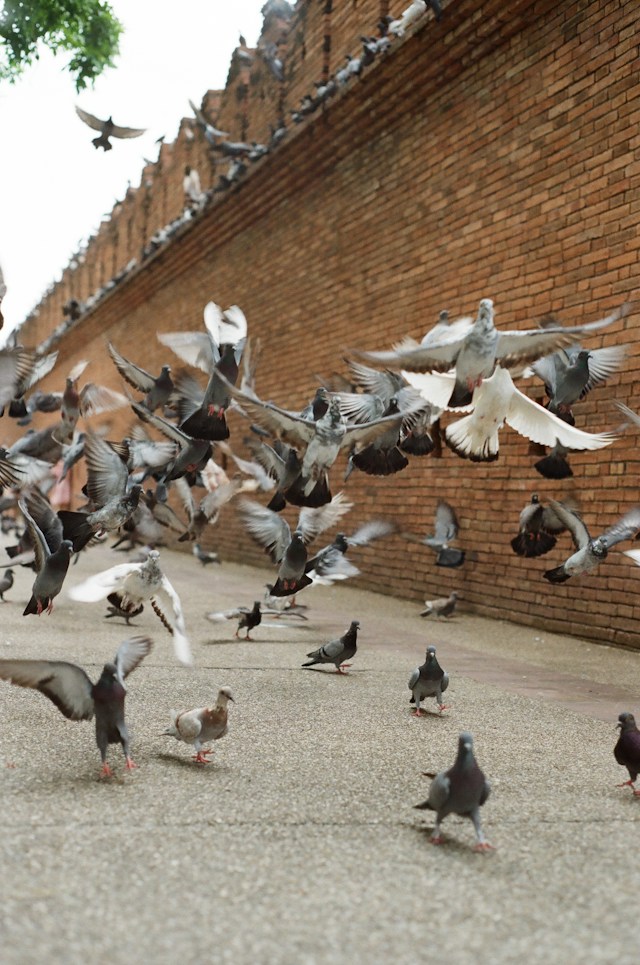In this winter that isn’t winter, I took a walk in the park. It was so warm the birds were out. Well, to be clear, the pigeons were out. A little girl who was at the park with her mom was trying to make friends with a small flock of them. She was following them around as they bobbed their heads, picking at crumbs on the pavement. As soon as she would get within two feet of one of them, it would shuffle away. Much to her frustration, they eluded her attempt at friendship. Finally giving up with a dejected cry, she settled herself into a soothing hug from her mother.
I was always taught that if you wanted something in life, you needed to go for it. I heard many proverbs to that end; “the early bird catches the worm”, “a rolling stone gathers no moss”, “time waits for no one”. And for the most part, I have found those proverbs to be true. Life tends to reward the go-getters, the industrious and the ambitious. Early birds and rolling stones very often get what they seek.
But I’ve also learned in life that some things will outdistance or elude even the most ambitious of us, just as those pigeons out-paced that girl. Not everything in life is a reward for the fleet of foot, or a prize for the earliest of early birds. In a game of duelling proverbs, one is reminded, “good things come to those who wait”.
One of my favourite stories in the Bible is the story of Elijah, a rather ambitious prophet who has done something to upset the powerful, and slightly unstable, Queen Jezebel. In a desperate attempt to escape her wrath, he runs into the wilderness, eventually finding himself at the foot of Mount Horeb. He climbs the mountain in hopes of getting closer to God who might give him a message as to what to do next. Upon getting to the top, he settles himself into a cave, and waits for God’s direction. What comes next is a cacophony of noise, as the mountain unleashes a variety of horrific displays of power; an earthquake, a fire and a tornado. Elijah, witnessing the chaos, believes that each one must be God’s chosen means of communication, only to be told that God is not in any of them. When the calamities have all passed, and the din has dissolved into the dusk of evening, Elijah finds himself sitting in deafening silence. And then, and only then, is God heard, in what the Bible describes as a “still, small voice.”
One of the spiritual disciplines that I have tried to teach myself lately is the discipline of sitting in silence. It’s difficult to do. There are always distractions that mutter, “come out and play”. And often I let them whisk me away. I readily give up my silent time to go the gym, meet a friend for coffee, or get to work on my next sermon. But I’ve also learned that I neglect opportunities for silence at my own detriment. The answers to life’s most poignant questions such as, “what’s next?”, “why did this happen?”, “where am I going?”, are rarely distilled or discerned when we are busy chasing pigeons, but often settle into us when we sit to rest. Elijah assumed that God was speaking to him on the centre stage of a grand performance of power, only to discover that God was in fact waiting for him off-stage, in the wings of silence. Perhaps hearing the “still small voice” is not the reward of the ambitious, as much as it is a gift to the patient. Or as Deepak Chopra said, “in the silence, we can hear the whispers of our souls.”
Sometimes I love chasing pigeons, and sometimes I weary of it. So, I’m trying something new. Instead of chasing, I’m sitting. Instead of talking, I’m listening. Instead of pursing, I’m waiting. I’m letting my rolling stone gather a little moss, and my inner bird sleep in. And guess what I am discovering….
When I’m not chasing the pigeons, they sometimes come right up to me.




